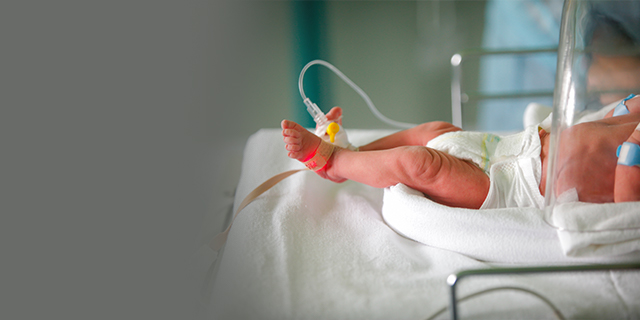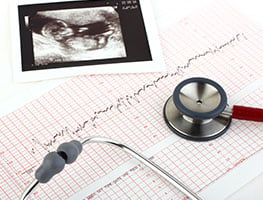Babies who are born early can develop a range of health-related complications. However, advances in the management of prematurity have meant that survival rates are extremely high, particularly for babies who reach 30 weeks.
Even before that stage, babies who are able to progress to 26 weeks gestation still have around a 60% chance of surviving.
It can be very difficult to identify why premature labour has occurred or why the membranes have ruptured. Many times premature labour is passed off as “one of those things”.
What Starts Labour Anyway?
The answer is that we don’t really understand the mechanisms involved in the onset of labour. It is thought that the baby is responsible for sending a hormonal message, which acts as a catalyst for labour to commence. This may be generated from the baby’s lungs as a sign that they are ready to start breathing independently and they no longer rely on the umbilical cord to deliver oxygenated blood to them. Another theory is that the placenta secretes hormones, or, that the mother’s vagina and cervix produce higher levels of a particular protein just before labour starts.
Risk Factors for Premature Labour
There is a range of factors that increase the likelihood of a baby being born prematurely, though these are not absolute:
-
Maternal health conditions such as preeclampsia, gestational diabetes, auto-immune disease, uterine, urinary tract or other systemic infection
-
Smoking cigarettes.
-
Previously giving birth to a premature baby increases the risk of it occurring again
-
Having a multiple pregnancy increases the odds
-
Inadequate maternal nutrition, inadequate weight gain or alternately, gaining too much weight during pregnancy
-
Placenta praevia, placental abruption, antenatal haemorrhage
-
Periodontal Disease
-
Premature labour is more common in women who are under the age of 17 years and over 35 years
Even when no risk factors are present, babies can still be born early. Around half of the mothers who deliver their baby prematurely do not have any known risk factors.
Sometimes premature labour is unavoidable and other times it is intentionally planned. Labour can be initiated or brought on when there are more risks to the baby (or the mother) by continuing with the pregnancy. When this occurs, the cost vs. benefit equation is weighed up. The womb is not always the safest place for babies to be.
Labour can be started in the maternity ward by the midwife or obstetrician artificially rupturing the membranes (ARM) and sometimes, starting a Syntocinon drip. This is a hormone that makes the womb contract and initiate labour. Vaginal delivery follows in most cases, unless the baby becomes distressed or the labour fails to progress; in which case a caesarean section delivery of the baby occurs.
Caesarean section delivery may be planned before a baby reaches term. For example, when a mother is unwell, has Preeclampsia, diabetes or placental insufficiency, then a caesarean section can become the safest option, even if the baby has not yet reached full term.
Signs and Symptoms of Premature Labour
-
Spontaneous onset of uterine contractions before full term
-
Premature rupture of the membranes before the baby is due
-
Vaginal bleeding
-
Pressure in the back
-
Dilatation of the cervix before the baby is due
Note: For mothers who have had babies before, it is normal for the cervix to be partially dilated towards the end of her pregnancy
Health Risks for the Mother Having Premature Labour
-
Bleeding and infection
-
Emotional distress due to having the baby earlier than expected and being unprepared
-
Potential interruption to bonding and attachment, particularly if the baby is taken away for special care management
-
Delivering via caesarean section or needing to have a forceps delivery is common. Premature babies’ heads are very soft and need protecting as they descend down the mother’s birth canal. The mother may still require an episiotomy even though her baby’s head is small. It is common for obstetricians to use forceps when delivering a premature baby as this helps to control the delivery of the head and prevent it from rushing out too quickly.
Health Risks for the Premature Baby
-
Immature lungs and respiratory organs mean that they may need ventilation. Hyaline membrane disease is not uncommon in premature babies.
-
Gut problems such as necrotising enterocolitis, infection, brain haemorrhage and bleeding
-
Difficulty maintaining their own temperature due to immaturity of the temperature regulating centres in their brain
-
Sleepiness and fatigue, which can impact on feeding
-
Problems with maintaining their blood sugar level; may become jittery and need extra kilojoules to compensate for this
-
Little subcutaneous fat which then impacts on the baby’s ability to stay warm. Babies commonly lose 7% of their birth weight in the first couple of weeks after birth. In babies who are premature and don’t have much fat to spare, this 7% can be significant.
-
Difficulty for parents in handling their baby. Premature babies can appear very small and fragile and this can impact on parental confidence and enjoyment. Potentially, there can also be issues with emotional attachment and bonding because of the separation of the baby and mother due to special care support.
-
Interruption in initiating successful breastfeeding.
What Can I do to Stop Going into Labour Prematurely?
-
Have regular, sound antenatal care at the recommended stages of gestation.
-
Avoid gaining too much weight. Around 12 kg is the average over the course of a pregnancy.
-
See your dentist at least once during your pregnancy, brush your teeth at least twice a day and floss. Infected gums produce prostaglandins – the very same hormones that initiate labour.
-
If you feel the onset of labour before full-term, make sure you are checked by your midwife or obstetrician.
-
If you have any of the risk factors listed above, be mindful that you could potentially have your baby earlier than when it is due.
Treatment for Prematurity
During the delivery of a premature baby, where possible, a paediatrician is present. If breathing assistance or resuscitation is required, then time is an important factor. Ensuring the baby is well oxygenated, accurately assessing its Apgar score and giving medications that can initiate respirations are all factors which require immediate, specialist attention.
If a mother suspects she is going into premature labour, it is imperative that she contacts her midwife, obstetrician or the labour ward of the closest hospital. Labour can be halted in many cases, stopping it from progressing. However, if the membranes have ruptured and the cervix is already dilated, holding off labour is impossible.
Steroid medication can be given to the mother to help with maturing her baby’s lungs. This helps to avoid the need for ventilation and supports the baby towards breathing independently.
Bed rest is another standard recommendation for threatened premature labour. Ideally, this is done at home with support provided by partners, friends and family. However, if the baby needs close monitoring and it is impossible for the mother to receive practical support at home, hospitalisation becomes necessary.
Avoiding sexual intercourse is also important as this can initiate labour and contractions, particularly in a woman with a sensitive cervix. Treatment for prematurity depends on the gestation of the baby. Very premature babies need help with their breathing and may need to be ventilated. This is because their lungs are immature and not capable of independently expanding and deflating.
Long-Term Outcomes of Premature Birth
Again, this depends on the extent of prematurity and the factors relating to why it occurred. Some babies need to remain in hospital for months following their premature birth, and others for only a few weeks.
Remember, in the majority of premature births, there is nothing a mother could have done to prevent it from occurring. Guilt has no part in coming to terms with having a premature baby.



















